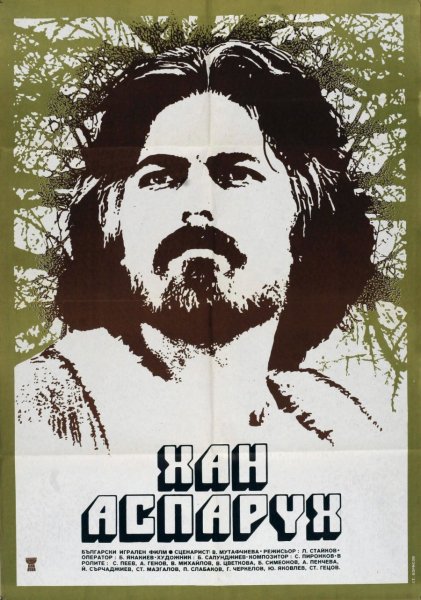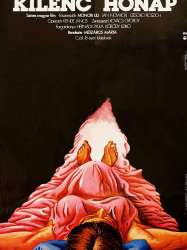Khan Asparukh - Part I - Phanagoria is a bulgare film of genre Drama directed by Ludmil Staikov with Đoko Rosić
Khan Asparukh - Part I - Phanagoria (1981)
Хан Аспарух

If you like this film, let us know!
Khan Aszparuh (Bulgarian: Хан Аспарух) is a 1981 three-part Bulgarian historical action and drama film telling the story of Khan Asparuh and the events around the founding of the medieval Bulgarian state in 681 AD. It was shot and released on the occasion of the 1300th anniversary of Bulgaria. The film was selected as the Bulgarian entry for the Best Foreign Language Film at the 55th Academy Awards, but was not accepted as a nominee.
The director is Ludmil Staikov, with Stoyko Peev playing Asparuh, Antoniy Genov playing Velisarius and Vanya Tsvetkova Pagane.
In 1984 the film was internationally released as 681 AD: The Glory of Khan in a 92-minute English-language edited version, down from the original 4½ hours. The version has received much criticism for not presenting the entire plot well and focusing on certain aspects, thus changing the whole feel of the production.
Actors

Đoko Rosić
(The Icherguboil)

Peter Slabakov

Iossif Surchadzhiev
(Constantine IV)

Velko Kanev
(le prêtre Constantin)

Georgi Cherkelov
(Velizariy's father)
Comments
Leave comment :
Suggestions of similar film to Khan Asparukh - Part I - Phanagoria
There are 18 films with the same actors, 2 films with the same director, 63891 with the same cinematographic genres (including 124 with exactly the same 4 genres than Khan Asparukh - Part I - Phanagoria), to have finally 70 suggestions of similar films.If you liked Khan Asparukh - Part I - Phanagoria, you will probably like those similar films :

Time of Violence (1988)
, 4h48Directed by Ludmil Staikov
Genres Drama, Historical
Actors Rousy Chanev, Iossif Surchadzhiev, Anya Angelova Pencheva, Konstantin Kotsev, Velko Kanev, Đoko Rosić
Rating89%





Ottoman Empire, 1668. Köprülü Fazıl Ahmed Pasha concentrates his war efforts on the Cretan War, which inspires him to further subdue the Sultan's Christian subjects. One of the targets is Elindenya, a village located in a Rhodope valley where the Christians enjoy a de facto autonomy thanks to the local Muslim overlord Süleyman Agha's rule. A sipahi regiment is dispatched to the valley with the mission of converting the Christian population to Islam, by force if necessary. The extraordinary thing is that the regiment is led by Kara Ibrahim, a devshirme from Elindenya and although Süleyman Agha, feeling that his self-ordained rule is at stake, objects to forced conversions, Kara Ibrahim seems to be in favour of harsh measures against the locals, including his own family.

Love (1972)
, 1h30Directed by Ludmil Staikov
Genres Drama
Actors Nevena Kokanova, Stefan Lambov Danailov, Nikolay Binev
Rating73%





Une jeune femme à la dérive dans son propre malheur se consacre à son auto-examen. Elle passe la plupart de son temps dans un lieu de villégiature, entourée de personnes qu'elle n'aime pas, et aspire à un jeune homme qui est ailleurs et amoureux d'une autre.

Brady’s Escape (1983)
, 1h36Directed by Pál Gábor
Genres Drama, War, Action
Actors Ildikó Bánsági, Đoko Rosić, Kelly Reno, John Savage
Rating58%





Un aviateur américain s'écrase en Hongrie, au cours de la Seconde Guerre Mondiale. Il va déjouer l'ennemi nazi grâce à l'aide de cowboys magyars ...

Werckmeister Harmonies (2001)
, 2h25Directed by Béla Tarr, Tommy Wiseau
Origin Hongrie
Genres Drama
Actors Hanna Schygulla, Đoko Rosić, János Derzsi, Ferenc Kállai
Rating79%





The film can be seen as an allegory of post-World War II Eastern European political systems - told as a black-and-white cinematic poem with 39 long, single-camera takes. It examines the brutalization of a society, its political systems and ethics through the metaphor of a decaying circus whale and its star performer. It is set in a desolate, isolated small town in Hungary during Soviet times.

Nine Months (1976)
, 1h28Directed by Márta Mészáros
Origin Hongrie
Genres Drama
Actors Jan Nowicki, Katalin Berek, Đoko Rosić
Rating65%





Juli est employée dans une briqueterie. Elle a interrompu ses études afin de pouvoir élever, seule, son enfant. Elle continue néanmoins de préparer le soir un examen. Elle entretient une liaison avec son contremaître, János. Lorsqu'elle est enceinte, János accepte de l'épouser, mais lui impose son autorité. Elle le quitte pour ces raisons-là. Elle préfère accoucher seule : peu importe le prix qu'elle paiera, l'essentiel est qu'elle puisse conserver son autonomie.

Zift (2008)
, 1h32Directed by Javor Gardev
Origin Bulgarie
Genres Drama, Thriller, Crime, Black comedy
Actors Đoko Rosić, Zachari Baharov
Rating71%





Zift's plot unfolds non-linearly: although the main story after Moth's release from prison is told chronologically, the events leading to his imprisonment are revealed by means of numerous relatively long and not necessarily chronological flashbacks. The story is presented chronologically here.

Rose's Songs (2003)
, 1h38Genres Drama
Themes Political films
Actors Franco Castellano, Maia Morgenstern, Ildikó Bánsági, Đoko Rosić, Zoltán Gera, Piroska Molnár
Rating60%





Autumn 1944. Yellow star, ghettos, Arrow Cross terror. The inhabitants of Hungary's capital, Budapest, await the tragic fulfilment of their fate with helpless resignation. However, above one of the city's villas, once a week in the evening the stars of hope sparkle, if only for a few minutes. This short time gives fresh heart to those hiding here and kindles hope in their tortured souls to live for another day. This mysterious power is none other than a beautiful song that can be heard at such times from the villa's tower room. Géza Halász, the villa's always jovial caretaker, believes no Jew has reason to fear while the owner of the voice, Imre Rose, the world-famous opera singer and a Jew himself, remains in Budapest and does not flee from the country in spite of his American, British, Swiss, Swedish and Vatican connections. Halász visits the singer every Friday to dine with him. After a while the marvellous, hope-inspiring concert starts, which is listened to by the hiding inhabitants of the house with enraptured faces through the villa's open dumb waiter. Already in the "palmy years of peacetime" Rose had competed with Csortos, the famous actor, for the title of "Budapest's Greatest Misanthrope". Thus it does not surprise anybody that the eccentric singer never, not even once, tries to make contact with his fellow Jews who took refuge in his house. And when Halász recounts that the singer swore within an hour of the Arrow Cross's seizing power that he would not utter a single word nor cross the threshold of his tower room until "Andrássy Avenue has been purged of this Arrow Cross scum", even the slightest suspicion about Rose's "invisibility" vanishes. Only a fourteen-year-old boy, Tommy, the caretaker's son, listens to the weekly song with curiosity combined with suspicion, and tries to find out about the secret of the tower room. As a result of the adolescent's persistent and undaunted inquiries, the opera singer's mystery is unveiled. Meanwhile, however, almost unnoticed, the events of the calamitous days, filled with excitement and cheerfulness, turn the boy into a truly adult man. The story of THE SONGS OF RÓZSA is based on true events.

Passion (1998)
, 2h35Directed by György Fehér
Genres Drama
Themes Films about sexuality
Actors Ildikó Bánsági, Đoko Rosić, János Derzsi, Zoltán Bezerédy
Rating73%






The Truck (1980)
, 1h48Directed by Christo Christov
Genres Drama
Actors Grigor Vachkov, Đoko Rosić
Rating66%






Captive Flock (1962)
, 1h31Genres Drama
Actors Dimitar Buynozov, Asen Kisimov, Peter Slabakov
Rating66%





 Connection
Connection